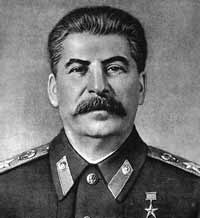Stalin: To win and to intimidate was his triumph
On March, 5, the day of Joseph Stalin’s death, the Russian Public Opinion Research (VCIOM) unveiled the data concerning Russian people’s attitude to Stalin’s persona and his policies.

Answers to the question whether the country followed the right course under Joseph Stalin were equally negative and positive. Every second respondent said that Stalin’s politics was right. There are also people who consider his policy erroneous.
The equal number of people whose answers are as wide as the poles apart is quite explicable. The first part of respondents considers the shift from the backward agricultural country towards the vigorous industrial power to be the most important achievement of that period. Others cannot excuse that painful shift and an unjustifiably great number of human losses.
Different approaches to the question give different assessments.
But everyone agrees that Stalinist repressions (1930-1950) were the most memorable events of his rule after the Great Patriotic War.
That is the way 50 percent of respondents assessed to the year 1937, when the largest number of executions took place. It was so huge that historians still do not know the exact number of human losses. According to different scientific assessments, the number of victims varies from 2 to 60 million people.
There are also people who erroneously consider 1937 the year of hunger (Holodomor, or the famine genocide, took place in 1932-1933). Others think it was the year of great constructions, lawlessness, collectivization, the time of personality cult – dark times on the whole. But 44 percent of the polled did not remember any particular events in that year at all.
It is worthy of note that most people believe that the cleansing of the Soviet Army was the reason for military failures at the beginning of the war. About ten percent of respondents did not know what to answer. Three percent of Russians assessed these activities as effective for the defensive capacity.
Unanimity was reached in the question about the necessity of repressions. Only two percent said that it had been a right step of the Soviet government. Others said that Stalin had gone too far, and caused immense sufferings to innocent people. Many said that Stalin conscientiously committed those crimes.
Recalling the names of well-known statesmen who suffered under the Stalinist regime, Russians named Mikhail Tukhachevsky, Alexander Solzhenitsyn, Vasily Blyukher, Nikolai Bukharin, Andrei Sakharov, Nikolai Vavilov, Osip Mandelstam, Konstantin Rokossovsky and Georgy Zhukov.
About 50 percent of the polled Russians think that all the people convicted for political motives were innocent.
Finally, answering the question about Stalin’s role during the Great Patriotic War most respondents concluded that the victory resulted in common efforts of the head of state and the Red Army. We cannot divide the victory between people and Stalin who was in charge of the military commandment.
Joseph Vissarionovich Dzhugashvili was born in Georgia (in Georgian ‘dzhuga’ means ‘steel’). His father was a cobbler. He was the third son in the family, but his brothers died young. Stalin’s father was cruel and powerful; he used to beat his wife and son. It seemed to adversely affect the boy’s character.
Joseph entered the Georgian Orthodox Seminary of Tiflis, but he was expelled for his involvement with the Marxist movement. Tenacity and love for power helped him achieve high positions. During the civil war he succeeded in using force of the Red Army and Lenin’s confidence to strengthen his positions.
In 1922 Joseph Dzhugashvili was made the General Secretary of the Communist Party. His close friend Joseph Iremashvili described Stalin’s further ruling: “To win and to intimidate was his triumph.”
In 1953 Stalin died at age 74. It is generally believed that he died of cerebral haemorrhage. Another version says the Soviet tyrant was poisoned.
Strana
Translated by Julia Bulygina
Pravda.ru
Subscribe to Pravda.Ru Telegram channel, Facebook, RSS!


